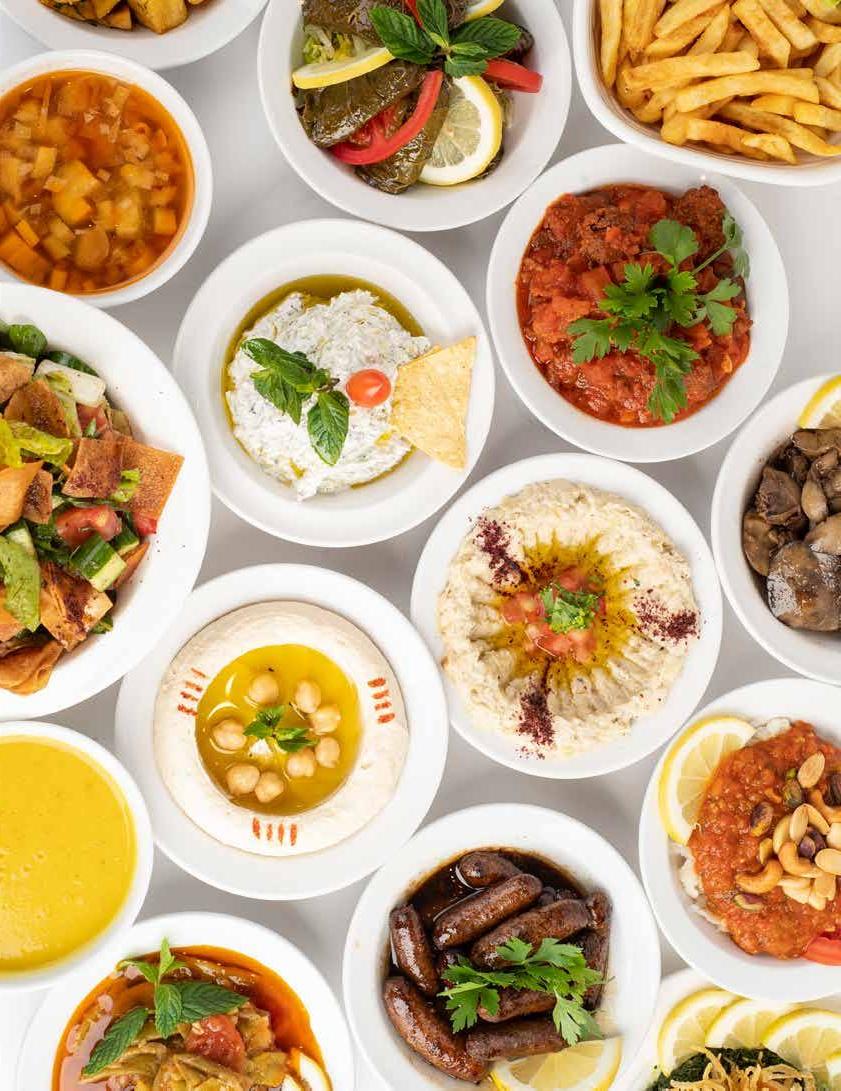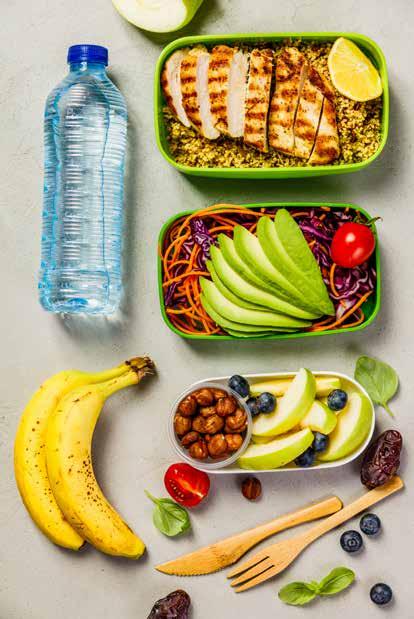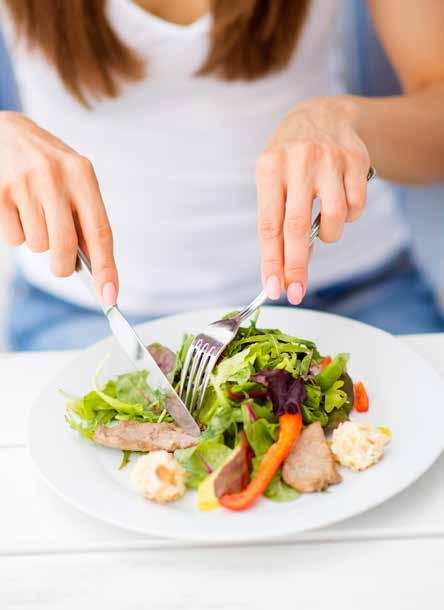
6 minute read
Life Lessons About Food
TAKE FIVE for Food
WRITTEN BY RICHARD FRANK, FOUR SEASONS NATURAL FOODS
Well, here we are still in COVID times, working towards the next chapter.... hopefully a better one. We’ve all had time to think about various aspects of life that are important to us--for me, I’ve thought some more about healthy eating and distilled much of these thoughts into some simple guidelines below for your reflection. (I did say I’ve “thought about” not necessarily done, so there’s a difference. There is no preaching here. You are on your own--as it should be!) We all know where our life story ends, and we will have periods of sickness and of health no matter what along the way. However, it seems, everybody’s got something. Our best goal is to help our odds to buy healthier times which is important because reasonably good health is at the basis of everything else we may want to do. And mistakes, many repeated over and over, eventually help us learn and improve. The “wisdom” below comes and will continue from this process. This is a synthesis of what I’ve heard, learned and experienced, not original thought. Please alter anything you may find at all useful to your own common sense and health conditions.
Finally, although you may likely be expecting to next read a list of organic, hand-crafted, local, unprocessed, nonGMO foods you should eat and a list of high fructose, sugared, processed, trans fat foods you shouldn’t, I skipped all that. Yes, those lists have wisdom, but are only part of the equation. I think the simple (not to be confused with easy) suggestions below are essential, no matter which other lists you follow.
13 MEALS, 2 SNACKS a day That’s it--eat discrete meals and snacks. Make a plate, sit down, eat, get a little more if you need it. Then stop. The concept of grazing, though has appeal, means your organs aren’t getting to rest.
There’s something about letting your body have fuel and then letting it pause and rebuild to feeling hungry that helps the system work better. It’s kind of like those old rechargeable batteries: it was better to let them drain all the way down and then recharge them. A snack is fine between meals, but even here, it’s a finite process and not a constant stream. If you are always eating, you are never hungry and never full, so your body can’t help you regulate your food intake. But, if you are like me, this is a huge challenge--constant snacking feels so right--until your body starts speaking up with inflammation, digestion irritation and weight gain.

2EAT TO 80% CAPACITY When you do eat, don’t eat until you are full... it’s too late, way too late, by then. Eat what is reasonable and then stop. Let your body catch up to your brain and start giving you the signals to stop consuming. Leave the kitchen for a bit, go for a walk, get busy on the computer, and then come back to clean up. Find a strategy that works for you to allow you to be finished with the meal. The Japanese call this food restraint Hara Hachi Bu. Look it up. Feasting has a place in life, it just should not be every day! Of course, eating until you feel full, so incredibly full, feels so good--until the bloating, weight gain, bellyaches, chronic disease and digestion issues start up.

3DRINK WATER. If you are really smart, primarily drink just plain water as your beverage and a good bit of it, but don’t go insane. Your body needs hydration to function and more than you might think even in winter...sitting inside...at your desk... barely moving. But you also don’t want to constantly be drinking either. You aren’t flushing a pipe and your kidneys have to process all the liquid you bring in, so it’s a balance. Water fills you up too, which makes you less hungry, which helps with the first two principles. Not drinking enough water through the day because you are too stressed and too busy is so easy to do--except for the chronic dehydration, headaches, fatigue, and lower immune functioning.
4DON’T EAT AT NIGHT If you sleep at night (vs work etc.), don’t eat after 7 PM or about 4 hours before you go to bed and drink water only minimally during that time period too. Going to bed on an empty stomach makes a big difference, at least to me. But it takes a lot of willpower to not eat at 9:30 pm. As pathetic as it seems, sometimes it feels almost Herculean to not eat then. One useful technique: brushing teeth early helps because then the laziness of not wanting to brush again before bed fights with the gluttony. Try it. Of course, a late-night gorge, (I mean snack!) feels so right to that impulsive, nihilistic, person lurking inside. But if you can manage to subdue that person, then the blameful, austere puritan who rises each morning also gets a break too. Allowing your body to rest from digestion at night, makes you sleep better, wake more easily, maintain body weight, and start your day (which actually begins at midnight) on better footing.
5EAT VEGETABLES. Be sure to consume a variety of (fresh when possible) vegetables throughout your meals and snacks. I don’t know all the reasons why, but it’s a huge aspect of maintaining better health. It almost doesn’t matter which ones you consume; they all have benefit. Fortunately, for me I like vegetables. A while back, a guy for whom I was cooking told me that he felt about vegetables the way I felt about meat, he despises them. (I’m actually not anti-meat, only pro-vegetable.) If that’s you, well, bummer, cause you need them. We had a customer who alternated a bite of vegetables with a bite of cookie.... good technique. The well-known food thinker, Michael Pollan, has wisely summed up this concept: Eat food, not too much, mostly plants. So that’s five simple things you can do to help your health. I find if I commit to following these principles for one week at a time, it helps to achieve them more consistently. Find the person in you that can appreciate this balance--not the mindless gorger and not the draconian dieter. There is a normal person in the middle, who cares about their health enough to know that some restrictions are healthy and okay, but also the enjoyments of food are too. On some level, all these suggestions are about maintaining common-sense in eating and a belief that it’s quantity, not always quality that matters. Even if you make good food choices, too much of a good thing is still too much. And, if you don’t always consume super premium fuel (though for the record, what you do eat has to be a valid fuel type at a minimum in that it’s recognizable as food), not overfilling your tank can help your body to function better too. As with much else...from the wise Greek philosophers--Everything in moderation! SF












